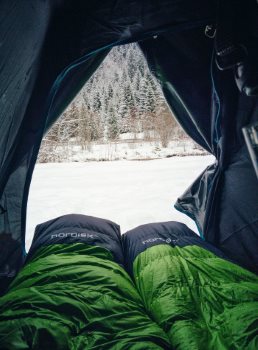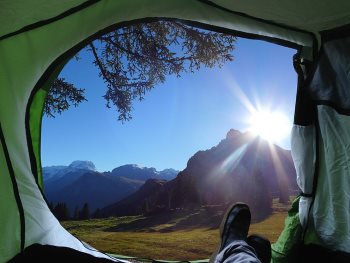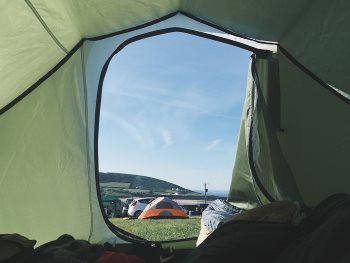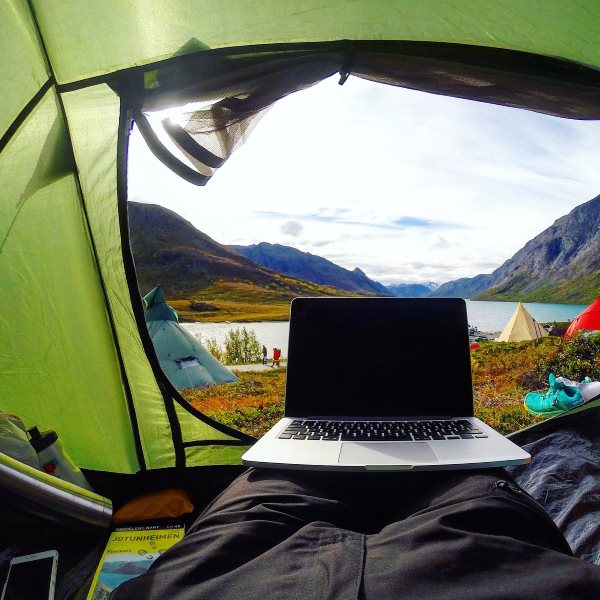Sleep can be defined as a naturally recurring state of mind and body, characterized by altered consciousness, and a relatively inhibited sensory activity inhibition of nearly all voluntary muscles.
A good sleep is essential as it helps the body to relax. This sleep is equally important even when you are “roughing it” in the great outdoors. You should be thinking about the quality of your sleep well before you ever embark on the trip. You might require certain equipment or a specific location to get the most out of that rest.
Some of the most important equipment includes a sleeping bag (or a camping cot), a good choice of the camping site and a tent. Importantly, the choice of the camping site greatly determines the kind of sleep one is going to get and the equipment required. It’s highly advisable to choose good areas that can provide a good night sleep.
Moreover, camping is an act of going out on a trip during holidays for a few days away from home. Camping can be done in game reserves, national parks, mountains, forests and other exciting places.
This requires carrying tents, food and all the other necessary requirements for the camp. During the camping period, it’s always important to have adequate sleep. You often need more energy in situations like this, which makes a restful night very critical.
For this to be realized, a lot of preparation is required. This will include: familiarizing yourself with the camping site, knowing the essentials of camping sleeping tips, your kit, how to adapt to your outdoor sleeping, before bed preparations, overnight routine and how to deal with extreme temperatures.
Making the good selections on what you need (especially the type of sleeping bags) will help you to have a good night’s sleep during a camping trip.
Essential Sleeping Tips
When camping, one needs to have sufficient knowledge about some of the important factors that impact sleep. Some of the most important tips to consider include:
1. Choice Of Camping Site
Look for a level spot for tent pitching if your choice is a rough ground or a sloping ground. This is all because carrying a mattress with you will absorb most of the rough spots. If you end up having your area of sleep on a slope, sleep parallel with your head at the higher end. Avoid having your head downhill whenever possible.
2. Clean Yourself Before Crawling In Sleep Bag
Dirt leads to a sleepless night. Therefore, it is important to maintain personal hygiene.
3. Sleep Within Earshot Of Running Water
However, do not sleep so close where flooding can occur. Also, avoid sleeping on the only way animals use to the river.
4. Open Vents In Tent For Air Circulation
This is very important for your sleep even in cold weather. This minimizes clamminess.
5. Avoid Drinking Lots Of Water Before Sleeping
This all because waking up to empty your bladder every hour or so will distract your sleeping pattern.
6. Get Warm Clothing For Camping
Wear warm clothing, not only during the day, but also during the night. This will work well during a cold night carry warm sleeping clothes as well. This is to avoid a cold night which will lead to restless sleep.
7. Carry a sleeping bag
They take the place of a mattress and blanket. A sleeping bag is less bulky and easily portable.
Sleeping Kit

There are different types of sleeping bags depending on the site of camping and the respective temperature at the chosen place of camping. A sleeping bag can be light or heavy, and have varying degrees of warmth.
Therefore, a good sleeping bag is one of the essential tools for a good night sleep out in the open. Some of the good examples of the sleeping bags include:
1. Square Sleeping Bags
This is the basic bag shape. This type of bag is very spacious — providing room for the body to move about. It also enables you to sleep without feeling constricted.
2. Sleeping Pods
These bags are so wide for half their length. This space gives you enough room to turn move in your bag more easily although space is more than what you may require. This would be a good choice for a nice sleep
3. Mummy Sleeping Bags
From the name “mummy”, the bag will keep you close thus it keeps you warm through the night. To prevent it from cooling due to the circulation of the air, its bottom is tapered.
Sleeping Platforms
There are different types of sleeping platforms depending on the person. Some of these options include:
1. Self Inflating Foam Pads
This is a compressible type of mattresses that is made with a waterproof cover. They have a spongy foam construction. On turning the valve, the vacuum will be filled by air thus expanding the foam. It is important to choose the right pad that will suit you. Some pads are thinner thus making it easier to carry them while thicker ones offer more comfort. Both are are good insulators against cold, though.
2. Foam Pads
When sleeping on snow covered, cold or frozen areas, this is the ideal pad to use. The closed-cell foam can also be used on areas where the inflatable pads aren’t feasible, for example, rough ground surfaces. The pads are affordable and they cannot be destroyed easily. They also good cushioning and give adequate insulation.
3. Air Pads
The air is what provides cushioning in this case. Despite the fact that they have low weight, they do offer good cushioning. They are not automatically inflated and their insulation is somehow low.
4. Air Mattresses
They offer excellent comfort. Air mattresses are quite heavy and big to carry. It provides low insulation when the extreme temperatures set in.
Sleeping Extra

They include the light source for use at night, earplugs for blocking sounds made by animals and birds which may be uncomfortable, eye shades to protect your eyes at night and pillows to provide comfort in your sleep.
There are several things to care about when adjusting to sleeping outdoors. They include:
1. Mental Preparedness
You should be aware of your new environment and its surroundings which will consist of forests and rocky places. You should be prepared mentally to miss your normal comfy bed, and there will be no nearby washrooms or toilets.
2. Site Of Tent Location
The tent should be located at a place which is easy to adopt without much straining. A place that is flat, none-rocky and with no roots on the ground surface is ideal to set up your resting place. The place should be somehow clear from thick vegetation.
3. Physical Adjustment
While camping during extreme temperatures you can find it uncomfortable. During the day temperatures will be high while as the sun sets the temperatures will decrease and darkness will set in. Dress warmly at night, socks and hand gloves will also be essential to your adjustment. You should also have your lighting handy.
4. Relish Every Moment
Every moment you experience outdoors has some uniqueness. Each outing offers the chance to stay amidst nature, enjoying what the new environment gives. You will experience fresh air, the night breeze, the stars and the moon.
Outdoor sleeping gives us a new perspective on life. This is a chance that enables you to get away from day to day normal life. As a camper, you come closer to nature. This relaxation and experience are ideal for the enrichment of many areas of your normal life.
Before Bed Preparations
Before you get to bed to sleep while camping, there are a number of things you need to do so that you can have a good sleep.
1. Don’t Overdress & Dry Clothing
Clothes that are not dry (or are at least partially damp) should be avoided. Ensure you have warm clean dry clothes to wear before you get into your sleeping bag. Overdressing will bring restlessness in your sleep and this will probably hamper the effectiveness of your sleeping bag.
2. Consume Food/Drink
You should note that sleeping bags don’t generate heat, but our bodies do. When the body is undergoing digestion, it generates heat. The water will keep you hydrated, which will help your blood to circulate better. This can prevent uncomfortable situations like high-altitude headaches.
3. Remove Tent Clutter
Food and other things like scented toiletries should be kept away from the tent and it should be secure. The tent and its surroundings should be neat and free from food and scented things. If there has been spillage of food, ensure you clean it up right away. Food odor’s and scented things like toothpaste can attract dangerous animals and insects, so they should be avoided.
4. Maintain A Routine
Don’t get over what you used to do before you sleep because this will help you feel like home in the new environment. If you used to do press ups before jumping to bed, then do it here as well.
5. Cover Your Head
Covering your head and face will help keep the heat generating from your body, from leaving your body. Ensure proper covering of your face and head.
Overnight Routine

Do not underestimate it. It is a very important aspect of a good outdoor sleep.
Let me give you a few very handy tips, that have helped me in the past to get a some decent rest in the outdoors.
1. Sounds
While camping one should be prepared to encounter many sounds from their surroundings. Some noises from wild animals and birds can be too disturbing or instill fear in some people. If you know that such noises will prevent you from having a good sleep, then you should consider camping near by the river side, the calming soothing sound of the river as the water flows will help you enter into a peaceful night sleep.
2. Prepare For Washroom Trips
We usually make trips to rest rooms during the night. In this case, you should be fully prepared for the same. To be prepared means to have your essential items such as shoes, toilet papers, and light at the place where they are accessible. Shoes should be placed at the front of the tent, the light source (such as an outdoors headlamp) too should be handy and other necessary requirements.
Extreme Temperature Preparation
At night the temperatures can be so extreme, thus, adequate preparation should be done. The following should be considered:
- Ensure you are warmly covered in places where the heat might radiate from. A cap to cover the head and face is required. Wear dry warm socks, gloves, and long pants to help you stay warm and retain the heat from your body. Fill the free space in your sleeping bag by stuffing it with your other clothes and make a pillow using dry warm clothes.
- Before sleeping ensure you do a little exercise to warm up your body. The exercise should not be intense to an extent of sweating, but enough to warm you.
- Avoid taking alcohol before sleeping. Alcohol will deter you from having a proper sleep. It also brings a cooling effect to the body, preventing you from having the desired quiet sleep you want.
- You can have a water bottle with hot water or have a hand warmer in your sleeping bag. This will help a great deal in adding warmness to the sleeping bag.
- Drink water and make sure you eat some food. The water will keep you hydrated for good blood circulation and the food should be adequate to help your body generate heat during digestion
- You can sleep with a friend. Two bodies warm each other easily when close.
Conclusion
Camping is quite an interesting activity, and as we have seen, there are many preparations. These preparations have benefits which are realized if they are done adequately.
To realize a good outdoor sleeping/resting during camping, it is important to assess and know the essential sleeping camping tips. Secondly be well acquainted with the sleeping kits which consist of the sleeping bag, sleeping platforms, sleeping extras and how best to choose them.
Adapting to outdoor sleeping in the new environment is a key aspect of having a good sleep while camping. This can be enhanced through selecting a good tent location place, physical adaptation, mental preparedness and learning to enjoy the new environment.
Another ideal thing is to be adequately prepared before you sleep. Such preparations include having a meal and drinking water, do normal routines, and storing of your essentials safely.
One should also be prepared for overnight routines and finally for extreme temperatures. Preparedness for extreme temperatures includes wearing warm dry clothing, eating before you sleep, exercise and having warm non-alcoholic beverages.
[jbio template=”bootbomb0″]


0 comments